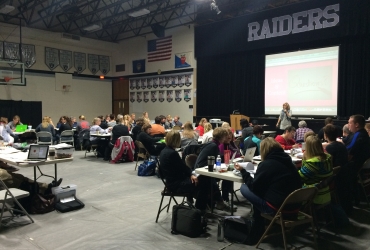Study Guides
Why Should I Study?
Good study skills can help you succeed:
- In school. Learning how to study can help make you a better student
- In the future. Many skills that make you a success in school can also help you succeed on the job.
Your attitude about studying is important.
- Think positively.
- Keep your goals in mind.
- Use your time wisely
Plan your study time each day.
- Keep a planning notebook to help balance your schedule. Your time is valuable-use it well.
- Plan for deadlines. Don’t leave assignments until the last minute.
- Do the assignment as soon as possible after class.
- Break large assignments into several small ones.
Make studying your job. Do it efficiently. Here are some tips…
- Keep regular study hours.
- Be comfortable (but not too much so). Have a straight chair and good light (with no glare).
- Face away from windows and other distractions.
- Clear off the top of your desk or worktable.
- Assemble needed materials ahead of time.
- Keep it quiet.
- Consider forming or joining a study group.
Taking notes is an important key to success in studying and learning.
- Don’t try to write everything down. Listen for key words.
- Listen for clues such as “the 4 causes were” or “to sum up”.
- If your class discusses the topic, note any major conclusions.
- If your teacher emphasizes a point, such as by writing it on the board, put it in your notes.
Develop your own shorthand system.
- Abbreviate words.
- Use common symbols.
When taking notes from books or articles…
- Get the “big picture” first. Glance through chapter headings, section headings and subheadings.
- Read summary paragraphs at the end of each section or chapter to get a general idea.
- Then read the entire chapter, looking for the key points of each paragraph.
How to take notes: Choose a method that works best for you. Here are some suggestions…
- Have a plan. Show the importance of key information by size or by understanding.
- Write clearly.
- Organize facts.
- Don’t try to write down every word.
- Use Roman numerals.
- Date each sheet.
How to write a report
- Know your subject.
- Take notes.
- Think of your main points.
- Make an outline.
- Arrange your notes.
- Write a first draft.
- Include footnotes.
- Review and Revise.
- Check your final draft.
- Ask someone else to check it too.
Tips For Taking A Test
Before the Test:
- Consider it a contest (you vs. the test-maker).
- Try to guess the questions-can you answer them?
- Review your notes, outlines, note cards, quizzes, etc.
- Look up points that aren’t clear.
During the Test:
1. Relax and forget about other people
2. Read directions carefully.
3. Look over the whole test first. Plan how to budget your time.
- For objective test questions (true/false, multiple choice, etc.)
*Read each question twice before answering.
*Answer the ones you know first.
*Circle the ones you skip and do these last
- For essay and short-answer questions.
*Cover only the points asked for in the question
*Think before you write
- Before you turn in your paper, check it carefully, if you have time. Ask Yourself:
*Did I follow the directions?
*Are there any spelling or grammatical errors?
*Did I answer each question fully?
After the Test:
When the test is returned, read any comments carefully so that you understand any mistakes you made. Talk with your teacher or instructor if you have any questions.



